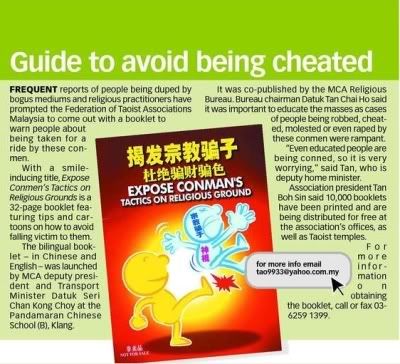All that said, don't be surprised if some of the Muslim friends you've invited to your open house (whichever celebration it may be) don't show up. While it's okay to wish, there are many who feel that it is not ok to cross-over and actually attend open houses of another faith's celebrations.
In June this year, Walski posted about the statements, and subsequent resolution, made during the Ulama Conference 2006, pertaining to the practice of Kongsi-Raya, urging for a review of this practice. It so happens that the Perak State Mufti had already issued a fatwa (religious decree) a couple of years back. A commenter, known only as Anonymous #3, pointed Walski to the Perak Mufti website, specifically the news item pertaining to the prohibition of celebrating festivals of other faiths, as well as the full written decision (PDF file) for the fatwa.
A rather fair, non-partisan, look at ibn Taymiyyah's career can be found at, where else, but Wikipedia, although you can find numerous other sites containing biographies of the scholar (here and here, to reference a couple).
ibn Taymiyyah, known for his prodigious memory and encyclopedic knowledge, may have contributed a lot to Islamic thought in general. He came from a family of renowned Hanbali jurists, and succeeded his father at a very young age.
But he was very much a literalist when it came to the interpretation of scripture. As to theological knowledge, ibn Taymiyyah held that the knowledge of the ancient scholars is superior compared to that of current ones. This is diametrically opposite to the generally accepted precept that knowledge actually grows over time.
And despite the fact that during his lifetime, he was the thorn in the side of many contemporary Ulama, ibn Taymiyyah is today regarded by many as a foremost jurist, earning him the title of Sheikh ul Islam (lit. Leader of Islam).
He rejected any ideas whose origins were extra-Islamic, and so his stand on celebrating, or even acknowledging, anything not construed to be of Islamic origin, is no big surprise. This also explains why those ulama who reference ibn Taymiyyah's work tend to exhibit similar opinions as the ancient scholar, as well as the conservative leanings of the Hanbali school of thought.
Anonymous #3's comment mentions the four sources of classical Islamic jurisprudence. Specifically, an ulama relies on four sources of juristic reference (in order of authority):
1. the Quran
2. the Hadith/Sunnah
3. the Ijma’ (i.e. consensus of traditional Islamic scholars)
4. the Qiyas (i.e. analogy of a known injunction/opinion applied to a new problem)
What Anonymous #3 did not mention was that the the first two sources of authority, the Quran and Hadith/Sunnah are not independently referenced or interpreted. Rather, established interpretations of classical scholars are used, primarily that of the four major Sunni schools of thought.
Which may sound reasonable, until one realizes that the four schools of thought were established sometime between the 8th and 9th century CE.
The roots of this practice is frequently attributed to another renowned classical scholar Al-Ghazali, whose teachings are thought to have laid the foundation for the closing of the doors of Ijtihad (independent interpretation of the Quran and Hadith/Sunnah).
So what we have today, therefore, is the derivation of Islamic laws and edicts based on the opinions of the classical jurists, in totality, most of which were already fully established around the 10th or 11th century CE. The last time Walski checked, the world has changed tremedously since then.
And herein lie some of the problems associated with classical Sunni methodology. Because independent interpretation of the Quran is not allowed, rather relying on millenium old views, and because the Qiyas cannot contradict the Ijma', what we have therefore is an application and rehash of ancient ideas and views upon current problems. Particularly when the application is done in the spirit of theology alone, disconnected from the realities of everyday life.
And when the choice of classical juristic references (and the ulama do have a choice) are literalist and conservative, so too will the derived rulings be.
Another problem is that the interpretation of established juristic norms are done in a purey textual manner - relying on text references of previous opinions and rulings - with little, if any, studies done on the impact on current society, or even a study and quantification of the perceived "problem" which requires a ruling. The emphasis becomes more on theological reasoning and a text-book application of established jurisprudence concepts, detached from the realities of everyday life. Empirical research and analysis is just not one of the tools the ulama utilize in the process of making judgements. No fault of theirs, however - the tradition and classical methodologies simply do not focus on this area.
Now, there is no doubt in Walski's mind that the prohibition issued by the office of the Perak Mufti was done purely out of noble intentions - to safeguard the faith of the Muslims from syirik - the association of any entity with God almighty. But the prevailing conservative leanings and literalist views have made it such that any nebulous association could become tantamount to syirik. All it takes is an authoratative statement from an ulama.
Attending another faith's celebration out of friendship and courtesy, therefore, becomes construed an act of piety towards that other faith. Nevermind that God, and God alone, knows what's truly in a person's heart. Nevermind that a Muslim's faith is probably not going to be swayed by oil lamps, simply because said lamps are used in another faith's rituals.
But consider this:
The Quran makes it crystal clear that associating any being or entity with God is syirik - no if's, and's or but's - for a Muslim, one's Submission must be to God, and God alone. And the Quran also makes it clear that the Prophet Muhammad's status, in comparison with the other prophets of God, is not any higher, or lower. Great and exemplary a man that he was, Muhammad was just a man.
Why, then, does the Sunni Islam Shahadah (declaration of faith) necessitate the inclusion of a declaration that "Muhammad is a messenger of God"? And that the declaration of "There is no god but GOD" (as stated in the Quran numerous times) is somehow not sufficient.
Now, isn't that, in itself, an "association"?
In the end, however, it is God, in His infinite wisdom, that knows best...
Walski's source acknowledgements: Many of the references made in this post have come from Wikipedia, and this has been done purely for the sake of convenience. It does not, in any way, imply that the other available references are of lesser value. The idea behind the reality-detached nature of contemporary juristic rulings comes from an article written by Dr. Mohammad Omar Farooq (Associate Professor of Economics and Finance, Upper Iowa University, USA), entitled "Islamic Fiqh (Law) and the Neglected Empirical Foundation".
Walski would also like to thank reader/commenter Anonymous #3 on the comment, which is what prompted this post. If Anonymous #3 doesn't mind it too, too much, kindly drop Walski an e-mail (not a comment) so that Walski can thank him/her properly.





































